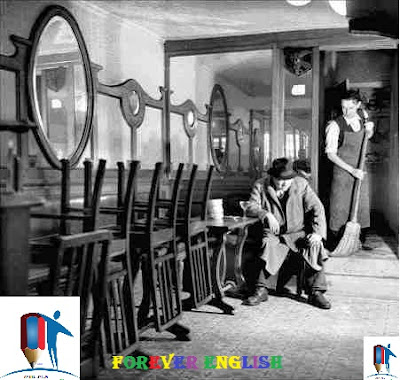NADA
"Brief information about the play, Short summary, plot and character analyses in "A Clean, Well-Lighted Place"
"Assimilation, existentialism, Separatism, Nothingness, alienation, and NADA in Ernest Hemingway's A Clean, Well-Lighted Place"
"Assimilation, existentialism, Separatism, Nothingness, alienation, and NADA in Ernest Hemingway's A Clean, Well-Lighted Place"
 |
| A Clean, Well-Lighted Place |
“A Clean, Well-Lighted Place” is a short story written by Ernest Hemingway and first published in Scribner’s Magazine in 1933. A Clean, Well-Lighted Place is a short story which is about a conflict between the old and the young waiter. At a first sight, Hemingway's "A Clean Well-Lighted Place" seems to be a very simple, unemotional, easy to understand and comment, and almost unfinished short story. However, when readers look for deeper meanings, they can find how meaningful is this story. The author's use of words and sentences gradually brings the readers to a higher level of understanding of the reality of the world and life. The truth is lying underneath the story the emotional darkness, eventual isolation, and existential depression caused by the nada, the nothingness. Nothingness, as it appears in Hemingway’s work, is a concept that derives directly from existentialism, which first emerged as a philosophical problem in the 19th century.
The story begins with two servers, older and younger servers, talking with each other while they wait for the last customer of the night to leave. The younger waiter is arrogant and rude to the last customer, while the older one is patient, kind and sympathizes with the customer's feelings and loneliness. When the café closes up for the evening and the customers left, except the old customer, the older server begins to see an existential crisis of his own according to the customer. With the old man, he eventually discovers a sense of meaning and purpose to his life amidst a world that is seemingly 'full of nothing'. Here, “full of nothing” is the key sentence of the story. Waiters understand that the word is full of nothing. There is no meaning in the world. Nothingness is kind of a condition people is faced with when their life has no meaning in the meaningless world, so there is no reason to exist.
The isolation from life is another sense the author uses to describe the word and the meaning "nada." The image of a lonely "old man who sat in the shadow the leaves" of the tree is resented a lot of times in the story. Some keywords are repeated, such as "the old man sitting in the shadow," shows the loneliness of the old man and how he suffers and the intensity of his separation from the rest of the world. The same significant point is portrayed by the writer with the old man's deafness. Old man "liked to sit late because he is deaf and now at night it is quiet and he felt the difference". Here, it may seem literary deaf but it’s not only deaf but deaf to the world, deaf to the society. The older waiter seems to understand this and reacts. He knows what it is to feel loneliness, to live on a deserted island, alone. In contrast with the younger waiter who has "youth, confidence, and a job”, the older waiter lacks "everything but work". The old waiter goes home as late as possible and only falls asleep as the light comes in.
The existential breakdown is yet another way the writer uses to show the story's main theme. A loss of faith brings any chance of having a normal life in that term. The old man's attempt to committing suicide is the symptoms of the depression he suffers and the story begins with a powerful description of an old man sitting late at night in the drinking alone. This oddly specific depiction has an aim in the story; it is a metaphor that immediately identifies the single most important feature of this character who is living in a world of darkness. Then, Hemingway gives the reason why he described old men in a detailed way:
‘“Last week he tried to commit suicide,” one waiter said.
“Why?”
“He was in despair.”
“What about?”
“Nothing.”
"Our nada who art in nada, nada be thy name thy kingdom nada thy will be nada in nada as it is in nada. Give us this nada our daily nada and nada us our nada as we nada our nadas and nada us not into nada but deliver us from nada; pues nada” or “Some lived in it and never felt it but he knew it all was nada y pues nada y pues nada y pues nada".
The only thing that keeps the older waiter alive is being busy with his job. But in contrast, the old man's dignity is all that he has left. He has nothing but his dignity. Everything else is just "a nothing." This is why the reason why the writer describes the old man in a detailed way and why the old man is "drunk every night" . This is why the old waiter is one "of those who like to stay late at the cafe". They are escaping from the nada, the nothingness that comes with existential breakdown.
 |
| A Clean, Well-Lighted Place |
To sum up; the author's use of words and sentences brings the readers to a higher level of understanding of the reality of the world and life. The truth is the emotional darkness, eventual isolation, and existential depression caused by the nada, the nothingness, and this nothingness as it appears in Hemingway’s work is a concept that derives directly from existentialism. The conflicts between the old waiter and younger waiter, the detailed description of an old man and the description of the place, and lastly the depth usage of the words (nada) and sentences (no meaning of life) convey the message of the Hemingway which is about the nothingness of the existentialist world.
No comments:
Post a Comment